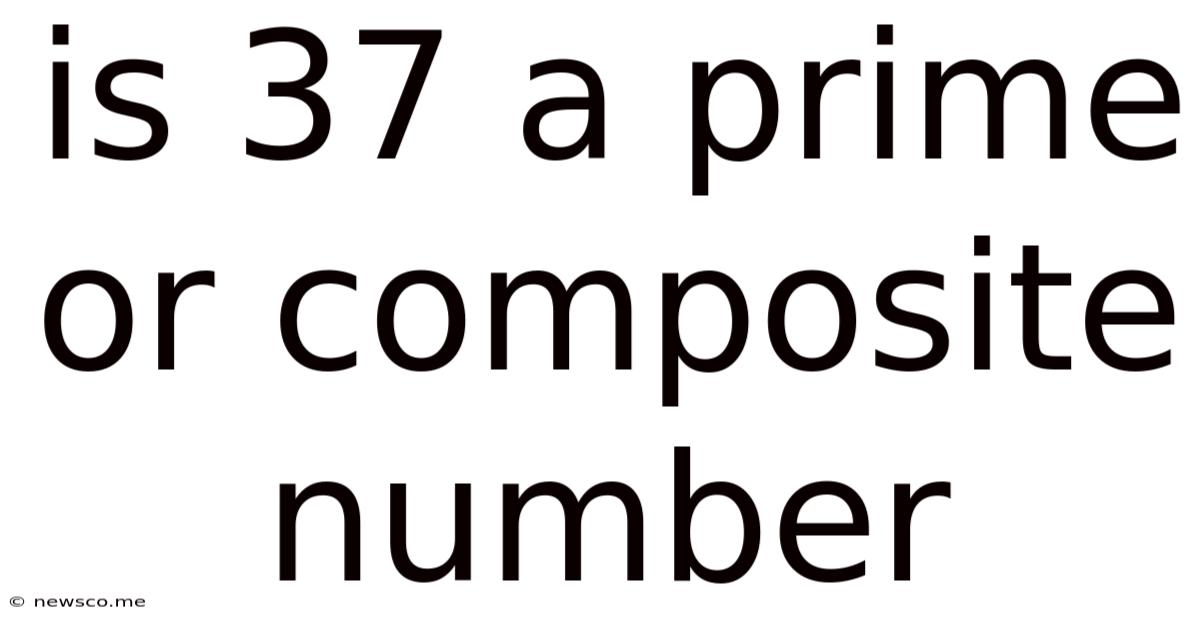Is 37 A Prime Or Composite Number
News Co
Apr 01, 2025 · 4 min read

Table of Contents
Is 37 a Prime or Composite Number? A Deep Dive into Number Theory
Determining whether a number is prime or composite is a fundamental concept in number theory. While seemingly simple for smaller numbers, the process can become surprisingly complex as we delve into larger integers. This article will thoroughly explore the question: Is 37 a prime or composite number? We'll not only answer this specific question but also provide a comprehensive understanding of prime and composite numbers, the methods used to identify them, and their significance in mathematics.
Understanding Prime and Composite Numbers
Before we tackle the specific case of 37, let's establish a clear definition of prime and composite numbers.
Prime Numbers: A prime number is a natural number greater than 1 that has only two distinct positive divisors: 1 and itself. This means it's not divisible by any other number except 1 and itself. Examples of prime numbers include 2, 3, 5, 7, 11, and so on. The number 2 is unique as it's the only even prime number.
Composite Numbers: A composite number is a natural number greater than 1 that has more than two distinct positive divisors. In other words, it's divisible by at least one number other than 1 and itself. Examples include 4 (divisible by 1, 2, and 4), 6 (divisible by 1, 2, 3, and 6), 9, 10, and countless others.
The Number 1: It's crucial to note that the number 1 is neither prime nor composite. It's a unique number with only one divisor—itself.
Determining if 37 is Prime or Composite
Now, let's address the central question: Is 37 a prime or composite number?
To determine this, we need to check if 37 is divisible by any number other than 1 and itself. We can do this by testing for divisibility by prime numbers less than the square root of 37. The square root of 37 is approximately 6.08. Therefore, we only need to check for divisibility by prime numbers up to 5 (2, 3, and 5).
- Divisibility by 2: 37 is not divisible by 2 because it's an odd number.
- Divisibility by 3: The sum of the digits of 37 is 3 + 7 = 10, which is not divisible by 3. Therefore, 37 is not divisible by 3. (A number is divisible by 3 if the sum of its digits is divisible by 3).
- Divisibility by 5: 37 does not end in 0 or 5, so it's not divisible by 5.
Since 37 is not divisible by 2, 3, or 5 (the prime numbers less than its square root), we conclude that 37 is a prime number.
Methods for Identifying Prime Numbers
While the method above works well for smaller numbers like 37, identifying prime numbers for larger integers requires more sophisticated techniques. Here are some commonly used methods:
1. Trial Division
This is the most basic method, as demonstrated with 37. We systematically divide the number by all prime numbers less than its square root. If none of these divisions result in a whole number, the number is prime. However, this method becomes computationally expensive for very large numbers.
2. Sieve of Eratosthenes
This is a more efficient algorithm for finding all prime numbers up to a specified limit. It works by iteratively marking the multiples of each prime number, leaving only the prime numbers unmarked. This method is particularly useful for generating lists of prime numbers within a given range.
3. Probabilistic Primality Tests
For extremely large numbers, deterministic primality tests can become computationally infeasible. Probabilistic tests, such as the Miller-Rabin test, offer a probabilistic approach. These tests don't guarantee primality with 100% certainty but provide a high probability that a number is prime or composite.
The Significance of Prime Numbers
Prime numbers are fundamental building blocks in number theory and have wide-ranging applications in various fields:
-
Cryptography: Prime numbers are crucial in modern cryptography, particularly in public-key cryptography systems like RSA. The security of these systems relies on the difficulty of factoring large composite numbers into their prime factors.
-
Coding Theory: Prime numbers play a role in designing error-correcting codes used in data transmission and storage to ensure data integrity.
-
Hashing Algorithms: Prime numbers are often used in hashing algorithms to distribute data evenly across a hash table, improving the efficiency of data retrieval.
-
Number Theory Research: Prime numbers themselves are a continuous area of mathematical research, with unsolved problems like the Twin Prime Conjecture and Goldbach's Conjecture continuing to challenge mathematicians.
Conclusion: 37 - A Prime Example
We have definitively established that 37 is a prime number. This seemingly simple number holds a significant place within the vast landscape of number theory. Understanding prime and composite numbers is fundamental to grasping many advanced mathematical concepts and their applications in computer science, cryptography, and other fields. The exploration of prime numbers continues to be a vibrant area of mathematical research, revealing the intricate beauty and profound implications of these fundamental building blocks of arithmetic. By understanding the methods for identifying prime numbers, we gain a deeper appreciation for their importance and the sophisticated techniques employed to unravel their mysteries. The seemingly simple question of whether 37 is prime or composite opens a door to a rich and complex world of mathematical exploration.
Latest Posts
Related Post
Thank you for visiting our website which covers about Is 37 A Prime Or Composite Number . We hope the information provided has been useful to you. Feel free to contact us if you have any questions or need further assistance. See you next time and don't miss to bookmark.